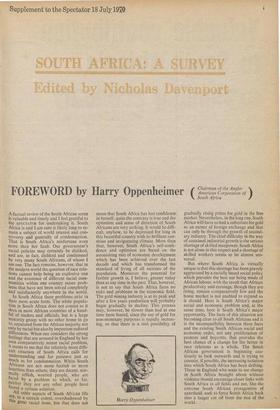FOREWORD by Harry Oppenheimer ( Chairman of the Angln of o-
) Ameri can Corporatio South Africa A factual review of the South African scene is valuable and timely and I feel grateful to the SPECTATOR for undertaking it. South Africa is and I am sure is likely long to re- main a subject of world interest and con- troversy and generally of condemnation. That is South Africa's misfortune even more than her fault. Our government's racial policies may certainly be disliked, and are, in fact, disliked and condemned by very many South Africans, of whom I i am one. The fact remains, however, that in the modern world the question of race rela- tions cannot help being an explosive one and the existence of different racial com- munities within one country raises prob- lems that have not been solved completely and satisfactorily anywhere in the world. In South Africa these problems exist in their most acute form. The white popula- tion in South Africa does not consist as it does in most African countries of a hand- ful of traders and officials, but is a large minority group with no other home to go to, separated from the African majority not only by racial but also by important cultural differences. When one considers the strong feelings that are aroused in England by her own comparatively minor racial problem, it seems to me that the infinitely more diffi- cult situation of South Africa calls for understanding and for patience just as much as for condemnation. White South Africans are not more foolish or more heartless than others; they are decent, nor- mally selfish, worried people, who are faced by a problem to which, so far, neither they nor any other people have found a certain solution. All other aspects of South African life are, to a certain extent, overshadowed by this great racial issue, but that does not mean that South Africa has lost confidence in herself; quite the contrary is true and the optimism and sense of direction of South Africans are very striking. It would be diffi- cult, anyhow, to be depressed for long in this beautiful country with its brilliant sun- shine and invigorating climate. More than that, however, South Africa's self-confi- dence and optimism are based on the astonishing rate of economic development which has been achieved over the last decade and which has transformed the standard of living of all sections of the population. Moreover the potential for further growth is, I believe, greater today than at any time in the past. That, however, is not to say that South Africa faces no risks and problems in the economic field. The gold mining industry is at its peak and after a few years production will probably begin gradually to decline. This process may, however, be slower than had at one time been feared, since the use of gold for non-monetary purposes is rapidly increas- ing, so that there is a real possibility of gradually rising prices for gold in the free market. Nevertheless, in the long run, South Africa will have to find a substitute for gold as an earner of foreign exchange and that can only be through the growth of second- ary industry. The chief difficulty in the way of sustained industrial growth is the serious shortage of skilled manpower. South Africa is not alone in this respect and a shortage of skilled workers seems to be almost uni- versal.
But where South Africa is virtually unique is that this shortage has been gravely aggravated by a racially based social policy which prevents the best use being made of African labour, with the result that African productivity and earnings, though they are rising, remain comparatively low and the home market is not enabled to expand as it should. Here is South Africa's major social and economic problem and, at the same time, here is South Africa's major opportunity. The facts of this situation are becoming clear to all South Africans and it is the incompatibility between these facts and the existing South African social and economic order, not any proliferation of protests and boycotts, that provides the best chance of a change for the better in race relations as a whole. The South African government is beginning cau- tiously to look outwards and is trying to counter, if possible, the increasing isolation into which South Africa has been drifting. Those in England who want to see change in South Africa brought about without violence should encourage closer links with South Africa in all fields and not, like the extreme South African protagonists of apartheid, seek to force South Africa back into a laager cut off from the rest of the world.






















































 Previous page
Previous page